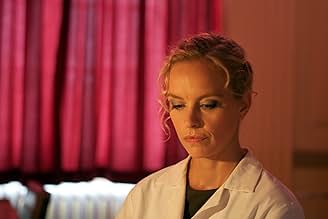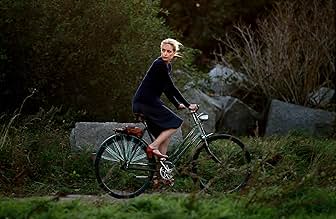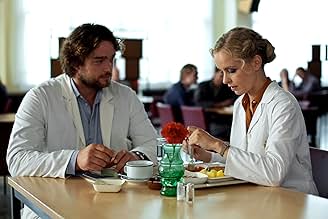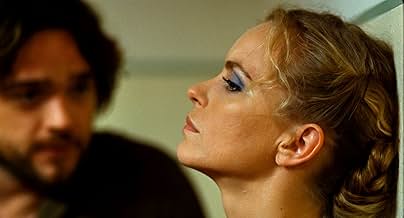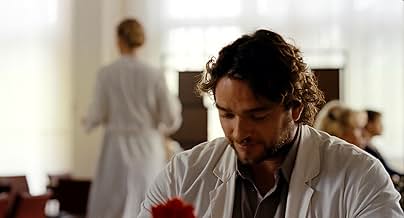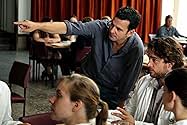A doctor working in 1980s East Germany finds herself banished to a small country hospital.A doctor working in 1980s East Germany finds herself banished to a small country hospital.A doctor working in 1980s East Germany finds herself banished to a small country hospital.
- Director
- Writers
- Stars
- Awards
- 10 wins & 24 nominations total
Claudia Geisler-Bading
- Stationsschwester Schlösser
- (as Claudia Geisler)
- Director
- Writers
- All cast & crew
- Production, box office & more at IMDbPro
Featured reviews
This year's Oscar entry from Germany is an edgy political thriller set in East Germany of 80s.
Nina Hoss plays the titular role. She is a doctor from Berlin banished to work in a small hospital in the provinces as punishment for her attempts to emigrate to the West.. Despite being choked by the omnipresent & omniscient secret police - Stasi - & surrounded by people she cannot trust, Nina Hoss brilliantly personifies a defiance that is as resilient as it is understated.
The movie is almost completely devoid of any background score. But, the silences, natural sounds, even the door bell ringing & clock ticking have been used to such great effect to underline the oppressive existence.
A tour de force in film-making !
Nina Hoss plays the titular role. She is a doctor from Berlin banished to work in a small hospital in the provinces as punishment for her attempts to emigrate to the West.. Despite being choked by the omnipresent & omniscient secret police - Stasi - & surrounded by people she cannot trust, Nina Hoss brilliantly personifies a defiance that is as resilient as it is understated.
The movie is almost completely devoid of any background score. But, the silences, natural sounds, even the door bell ringing & clock ticking have been used to such great effect to underline the oppressive existence.
A tour de force in film-making !
This brilliant German film explores two fundamental questions: whether it is possible to collaborate with a fundamentally oppressive state, and the acute degree of personal loneliness felt by those who cannot, and whom the state thereby treats as its enemies. The mundane depersonalisation of life under the Stasi is captured much more acutely, it seems to me, in this story than in the more acclaimed 'The Lives of Others'; that the leading collaborator is arguably a decent and attractive person, albeit one who has made different choices to the admirable but not wholly likable heroine, adds subtlety and humanity to the overall portrait of society. Both protagonists are excellent in their roles; the camera-work captures the underlying feelings of alienation in a way that reminded me of early Kieslowski. 'Barbara' is by turns bleak, poetic, emotional and thought-provoking: it deserves to be more widely known.
10yagian
I visited Eastern Europe, Berlin, Prague, and Budapest, in March 1990. At that time, the Berlin Wall had already been fallen down, but Germany had not reunited yet.
People could freely come and go over the borders between East and West Germany. I went through Checkpoint Charlie to East Berlin, and I visited retro-future TV tower and saw Ladas running on street.
In a night train from Berlin to Prague, I asked a passenger who sat next to me if Germany would reunite in a year, and he answered that he didn't believe it would happen so early. In fact, Germany reunited in October 1990.
Although I actually visited East Berlin, now, it is hardly for me to believe that the half of Germany was a communist state just twenty-three years ago.
--------------------
"Barbara" is a German film about people living in East Germany in 1980. Barbara is a female doctor, who was watched by the secret police.
It is one of the greatest German films that I have ever seen. There is no exaggeration and omission in this film. Every element in it is necessary, and I couldn't find that any things were unnecessary.
This film is very quiet, because there is no background music. That makes audience concentrated in every tiny sound. Barbara was always nervous about the secret police, so she got surprised when the doorbell started to ring, and the audience also got really surprised with the sound of the doorbell, and fully understood her emotion.
Nina Hoss, as Barbara, was also great and attractive. She didn't overplay at all, but accurately expressed how Barbara felt in her mind. After seeing her performance, most actors and actress became to look unnatural.
This film is a quiet, simple, and elegant. If you love films, I strongly recommend you to see it.
People could freely come and go over the borders between East and West Germany. I went through Checkpoint Charlie to East Berlin, and I visited retro-future TV tower and saw Ladas running on street.
In a night train from Berlin to Prague, I asked a passenger who sat next to me if Germany would reunite in a year, and he answered that he didn't believe it would happen so early. In fact, Germany reunited in October 1990.
Although I actually visited East Berlin, now, it is hardly for me to believe that the half of Germany was a communist state just twenty-three years ago.
--------------------
"Barbara" is a German film about people living in East Germany in 1980. Barbara is a female doctor, who was watched by the secret police.
It is one of the greatest German films that I have ever seen. There is no exaggeration and omission in this film. Every element in it is necessary, and I couldn't find that any things were unnecessary.
This film is very quiet, because there is no background music. That makes audience concentrated in every tiny sound. Barbara was always nervous about the secret police, so she got surprised when the doorbell started to ring, and the audience also got really surprised with the sound of the doorbell, and fully understood her emotion.
Nina Hoss, as Barbara, was also great and attractive. She didn't overplay at all, but accurately expressed how Barbara felt in her mind. After seeing her performance, most actors and actress became to look unnatural.
This film is a quiet, simple, and elegant. If you love films, I strongly recommend you to see it.
Barbara (2012)
A somber, tightly scripted, almost old-fashioned film. I can picture this in black white, or a movie not only set in 1980 but shot then, too. I mean this all as a compliment.
It's key to know that this is Communist East Germany, a closed country under Soviet influence and generally struggling to keep up with West Germany. The doldrums depicted, and the lower quality of medical care at this small provincial clinic, are very real.
The title character is a downtrodden doctor who was caught trying to escape to the West, and was sent to the boondocks as punishment. And she is periodically searched by the authorities, who go through her apartment, her body cavities, her entire personal life while she passively waits. It's awful. And very real.
There is a steady vague story line showing Barbara's contacts to sympathetic Germans, and it seems one or two of them are visiting now and then from the West. Clandestine meetings with money (and sex) continue in the woods, but these are minor points in her steady work as a doctor in the clinic.
More important, it turns out, is the cute and steady-handed male doctor who runs the clinic. She doesn't trust him. If he asks questions out of curiosity she isn't sure if he's a spy or just a nice guy. We aren't sure either. His life is simple and has simple pleasures, and he likes her and tries to make her open up and actually smile, which turns out to be the hardest thing in the whole movie.
Barbara's plans to escape seem to be threatened by her job commitment, which she can't shirk because it'll draw attention to her irregularities. And so things go in this windy, North German countryside. It's so beautifully, patiently wrought, you have to watch and wait, just as passively as Barbara. It's sad, for sure, and yet there are these small glimmers. For one thing, there is the idea that no matter what your circumstances there is always the ability to be good and to do good. The male doctor is the example of this, and Barbara begins to see something more genuine at work than her own superficial (we assume) strivings for a consumerist West.
It's odd to see such a balanced and yet truthful view of Communist Germany. The oppression is real and bad, but the strivings of regular people (doctors and others) make hope possible. I loved this movie, even though fairly little happens, and there are few turns of the plot that are clearly for dramatic impact more than an integral building of character. But these are small caveats. The total effect is simple and penetrating, with a beautiful ending.
A somber, tightly scripted, almost old-fashioned film. I can picture this in black white, or a movie not only set in 1980 but shot then, too. I mean this all as a compliment.
It's key to know that this is Communist East Germany, a closed country under Soviet influence and generally struggling to keep up with West Germany. The doldrums depicted, and the lower quality of medical care at this small provincial clinic, are very real.
The title character is a downtrodden doctor who was caught trying to escape to the West, and was sent to the boondocks as punishment. And she is periodically searched by the authorities, who go through her apartment, her body cavities, her entire personal life while she passively waits. It's awful. And very real.
There is a steady vague story line showing Barbara's contacts to sympathetic Germans, and it seems one or two of them are visiting now and then from the West. Clandestine meetings with money (and sex) continue in the woods, but these are minor points in her steady work as a doctor in the clinic.
More important, it turns out, is the cute and steady-handed male doctor who runs the clinic. She doesn't trust him. If he asks questions out of curiosity she isn't sure if he's a spy or just a nice guy. We aren't sure either. His life is simple and has simple pleasures, and he likes her and tries to make her open up and actually smile, which turns out to be the hardest thing in the whole movie.
Barbara's plans to escape seem to be threatened by her job commitment, which she can't shirk because it'll draw attention to her irregularities. And so things go in this windy, North German countryside. It's so beautifully, patiently wrought, you have to watch and wait, just as passively as Barbara. It's sad, for sure, and yet there are these small glimmers. For one thing, there is the idea that no matter what your circumstances there is always the ability to be good and to do good. The male doctor is the example of this, and Barbara begins to see something more genuine at work than her own superficial (we assume) strivings for a consumerist West.
It's odd to see such a balanced and yet truthful view of Communist Germany. The oppression is real and bad, but the strivings of regular people (doctors and others) make hope possible. I loved this movie, even though fairly little happens, and there are few turns of the plot that are clearly for dramatic impact more than an integral building of character. But these are small caveats. The total effect is simple and penetrating, with a beautiful ending.
It's 1980 East Germany. Dr Barbara Wolff (Nina Hoss) is new in the backwaters hospital. She has isolated herself from all her colleagues. The secret police Stasi is keeping track of her for applying for an exit visa and she lost her job at a prestigious hospital in East Berlin. She can trust nobody even the chief doctor Reiser. There is a patient named Stella that has developed an attachment to Barbara. She is pregnant and is desperate to flee to the West.
I love the idea of this story. This should be a tense thriller of paranoia and fear. Instead this is slow moving, reserved emotionally and quiet. The long takes, medium shots, and the stoic performances strip the movie of its tension. The fact that she is holding her feelings so tightly may be fitting for the story. It doesn't always allow people to feel her fears. It's a specific way to do this story and it works on that level.
I love the idea of this story. This should be a tense thriller of paranoia and fear. Instead this is slow moving, reserved emotionally and quiet. The long takes, medium shots, and the stoic performances strip the movie of its tension. The fact that she is holding her feelings so tightly may be fitting for the story. It doesn't always allow people to feel her fears. It's a specific way to do this story and it works on that level.
Did you know
- TriviaThe Torgau workhouse to which Stella is sent is the Torgau Juvenile Detention Centre. The Centre, which ran from 1964 to 1989, was for the "re-education" of young people aged 14 to 18. Inmates had committed no crimes, but were deemed to need education so that they could fit in with the norms of socialist life in East Germany.
- GoofsAndre hands Barbara a cup of coffee, which she promptly drops. You see the shattered pieces of the cup on the floor, but no coffee.
- Quotes
André: Doctor Wolff will be working with us. She is from Berlin... from the Charite Hospital, and has decided...
Assistenzärztin Schulze: We have introduced ourselves.
- ConnectionsFollowed by Phoenix (2014)
- SoundtracksNocturne g-moll Opus 15 No. 3
Composed by Frédéric Chopin
- How long is Barbara?Powered by Alexa
Details
- Release date
- Country of origin
- Official sites
- Language
- Also known as
- Bárbara
- Filming locations
- Production companies
- See more company credits at IMDbPro
Box office
- Gross US & Canada
- $1,013,902
- Opening weekend US & Canada
- $63,410
- Dec 23, 2012
- Gross worldwide
- $6,908,277
- Runtime
- 1h 45m(105 min)
- Color
- Sound mix
- Aspect ratio
- 1.85 : 1
Contribute to this page
Suggest an edit or add missing content



